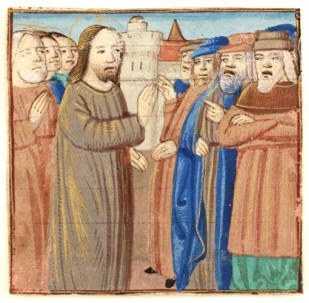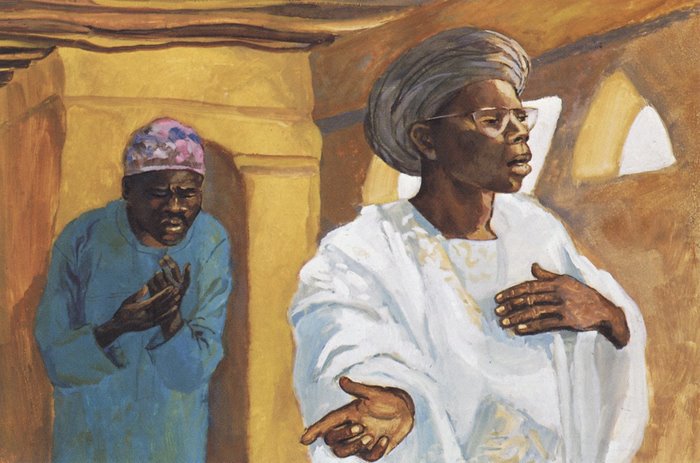Nov.
10, 2013
Haggai 1:15b-2:9
Ps. 145
2 Thess 2:1-5, 13-17
Luke
20:27-38
Years ago I knew people who claimed with pride to be on
Richard Nixon’s enemies’ list. We could laugh about it, because, other than our
beleaguered and slightly paranoid 37th President, such lists seemed far out of
character with American life.
But it strikes me now, in these rather dark days after 9/11,
that feeling beleaguered and paranoid has become part of the character of life,
here in America and just about everywhere else. I’m not talking about partisan
politics, nor the Bill of Rights, nor even about the NSA listening in on all of
our phone calls. What I am talking about is the pervasiveness of the feeling –
the world over – that we must be afraid – that we have got to ramp up our
security – that the barbarians are not only at the gate but they seem to have
snuck into our backyards while our heads were turned. Of course, bad things do
happen, in random and terrifying ways, and this fear has seemed to seep into
the very air we breathe, the water we drink, the conversations we have with
friends and strangers. This really is not just about the US – this is a global
phenomenon. What nation do you think has the most comprehensive system of
surveillance? Of spying on everyone, friend and foe? It is Great Britain, which
“is estimated to have more closed circuit tv cameras than any other country,
including China. They are found in every store, railway station, school or bus
– one for every 11 people[i]…”
Security cameras seem to be, perversely, a bit like the saints of God: you can
meet them in school or in lanes or at tea, in church or in trains or in shops
or at tea … but, do they really make us feel any safer? Or does having them
make us want more of them?
 It’s the comprehensiveness of it all – the global character
of it – that gives us a clue, I think, to the empire of fear and dominance we
read about in the Gospel. The Roman Empire is not in the background of the
story, but the foreground, as people who read the Bible closely point out to
us. For example, Luke begins his story of the birth of Jesus by telling us, “In
the days of Caesar Augustus a decree went out that all the world should be
taxed.” Front and center. Caesar Augustus. The Empire and its demands reached
into every corner of the known world, no matter how dusty, no matter how poor.
It’s the comprehensiveness of it all – the global character
of it – that gives us a clue, I think, to the empire of fear and dominance we
read about in the Gospel. The Roman Empire is not in the background of the
story, but the foreground, as people who read the Bible closely point out to
us. For example, Luke begins his story of the birth of Jesus by telling us, “In
the days of Caesar Augustus a decree went out that all the world should be
taxed.” Front and center. Caesar Augustus. The Empire and its demands reached
into every corner of the known world, no matter how dusty, no matter how poor.
The Gospel of Luke is curious: at times, it seems to be
eager to point out that this new religion of Christianity can co-habit
accommodatingly within the Empire. Luke picks up on sayings of Jesus like
“render unto Caesar what is Caesar’s.” But if Luke reminds his readers, and us,
that the people were under the thumb of the imperial domination system, it is
really to shout from the rooftops that that kingdom of death did not, and would
never, have the last word over their lives, over their communities, indeed,
over the whole world. Our God, Luke remembers Jesus saying, is not of the dead
but of the living, for to God, all children of the resurrection are alive.
In this story today, Jesus does seem to get into an obscure
doctrinal debate among two “parties” of Judaism: the Sadducees and the
Pharisees. The Sadducees were out of the mainstream of the Judaism of Jesus’
day; they chose to follow only the Torah – the first five books of the Bible.
The mainstream of Judaism included the psalms and the writings of the prophets
as sacred as well – writings that took in a much larger view of the world and
of God’s activity in it. Mainstream Judaism understood death and resurrection.
They had lived through terrible times, through the exile in Babylon and the
return to a destroyed Jerusalem. The prophets helped them understand God’s
actions in history and their own, human failures with in God’s history. The
psalms gave them songs to sing – songs of anguish and lament, but songs of
praise for all of God’s generosity and mercy. Mainstream Judaism knew what it
meant to break that old Torah covenant, to walk in the valley of the shadow of
death, and yet, by God’s most gracious, loving and forgiving hand, to be
brought back to life.
So Jesus gets into a debate with the Sadducees not about the
legal points of marriage but about their understanding of the future, and of
how God works in this world. If there is no resurrection, as the Sadducees say,
then death wins. There is no justice, only vengeance. The Roman Empire wins.
The surveillance cameras win. It is a tit-for-tat endless cycle. God’s justice
supersedes what humans impose, out of fear or need for control. God’s justice
takes every human hope, and exceeds them with mercy and abundance.
The story of this encounter between Jesus and the Sadducees,
as written down by Luke near the end of the
first century, vividly reflects
what was going on in those days. People living in Israel around the year 100
would remember Rome’s extraordinarily violent response to the Jewish Revolt
about 30 years before. It was the war during which blood literally ran in the
streets of Jerusalem and the Temple was destroyed. Even today you can see how
proud the Romans were of their victory over these conquered people, in the Arch
of Titus, depicting the legions carrying off the spoils of war from the looted
Temple. For the thousands upon thousands of Jewish dead to remain dead, after
such devastation, would mean that the Romans would indeed control the world,
that their victory would proceed any imposition of what they would call
“security” or “justice.”
But if Jesus and his followers understood whose world this
really was, whose justice truly reigned, then death and its domination system
would never win. If Jesus and his followers understood resurrection as the
restoration of God’s justice, of God’s abundance, of God’s mercy, then that was
what it meant to say that God was the God of the living.
It is very tempting to buy the world’s line: there is not
enough to go around. You are not safe enough, you don’t have enough money,
things will never work out, death is the end. There aren’t enough people in our
pews, and we can’t pay our bills. But people who believe in the resurrection
know better. We know that God is not God of our debt or our death, but a God
who gives us, and the generations who come after us, a living hope.






